The solutions for parentless (and unparented) children have varied tremendously over history and they vary, in part, based on the particular technological, economic, and cultural realities of the time. For more than 75 years, one answer was the orphan train.
In the 1850s,
…thousands of children roamed the streets of New York in search of money, food and shelter–prey to disease and crime. Many sold matches, rags, or newspapers to survive. For protection against street violence, they banded together and formed gangs. Police, faced with a growing problem, were known to arrest vagrant children–some as young as five–locking them up with adult criminals (PBS).
At the same time, farmers in the country were having as many kids as they could because kids were great farm labor. They could use as many hands as they could get.
So, in 1853, a minister named Charles Loring Brace started the orphan train. Brace believed that farmers would welcome homeless children, take them into their homes, and treat them as their own. So he rounded up the kids, got parental permission when he needed it, and took the city kids to the country. Between 1854 and 1929, the trains took over 100,000 children to adoptive parents in 47 states and Canada.
On the orphan train (image here):

Children lined up to board the train (1920) (image here):
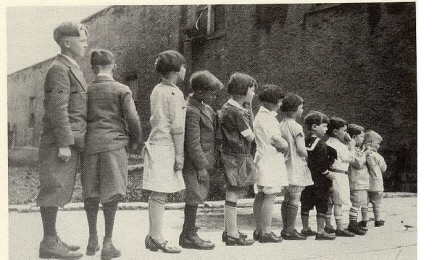
The orphan train in Michigan:
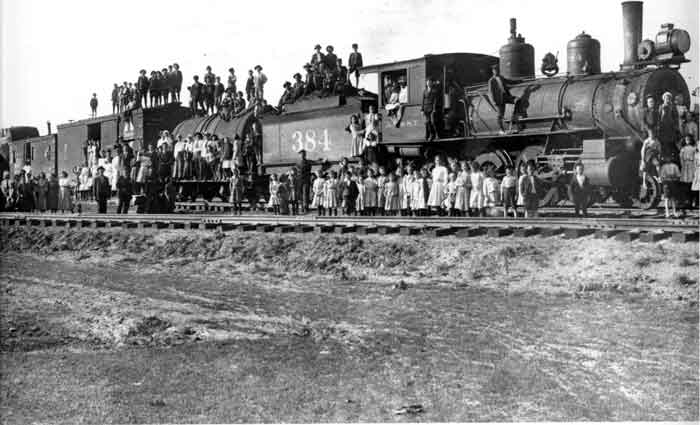
Orphan train children (images here):
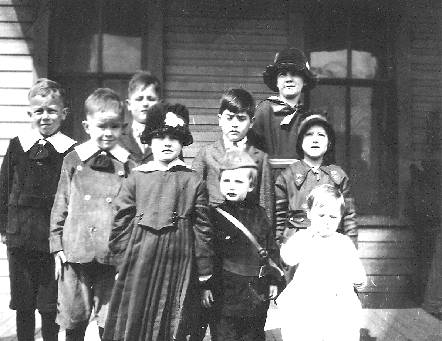
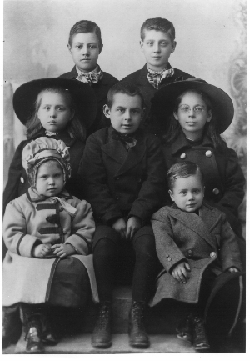
Howard with his adoptive parents, the Darnells (1910) (image here):

Orphan train children with their chaperones in Bowling Green (1910) (image here):

An ad and a news story from the Tecumseh Cheiftan (1893) and Nehama County Herald (1915) respectively (found here):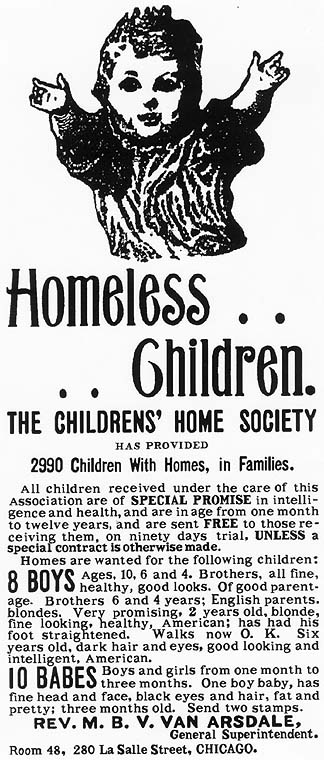
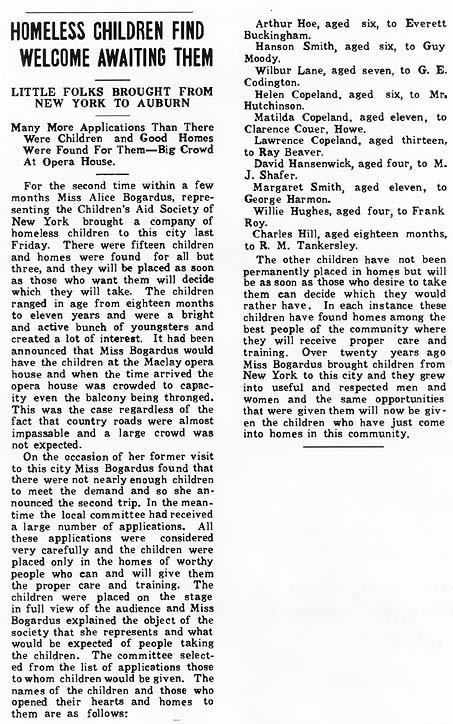

Comments 14
Jonathan — March 20, 2009
A large portion of those children were abused, both sexually and physically. Just thought it should be noted.
Bumerry — March 21, 2009
Like most things, the Orphan Trains were a mixed bag. On the one hand, they did genuinely rescue abandoned children forced into prostitution, begging, stealing and working in sweat shops when they could get work at all, and took them to homes where they were likely to physically survive to adulthood. On the other hand, as Jonathan points out, some (although " a large portion" probably exaggerates) were abused by "parents" who were only looking for slaves and treated them as slaves have always been treated.
Most of the recorded stories reflect very typical 19th rural childhood experiences after adoption, with large families and kids expected to do chores alongside their parents. For a child accidentally separated from her impoverished mother when mom fell ill, it was all misery. (Foster care workers still mistake poverty for neglect sometimes.) For a child whose parents traded his sexual favors starting at age five for opium, it was paradise. (Biological parents still do this sometimes.)
Most orphans on those trains fell closer to the middle of that spectrum, and did well for themselves after they were abandoned or cruelly abused by their parents and left homeless and starving. Flawed as they were, one can tell by the documents that the out placers meant well.
Jillian — March 24, 2009
Re: "Foster care workers still mistake poverty for neglect sometimes"
A lot of these kids were not actually orphans, but had parents who were very poor and pressured into signing away their parental rights, including, and perhaps more often than not, parents who did not hurt their kids-- but who were simply unable to feed, house, and clothes them. Instead of offering these parents welfare or services, and generally help to take care of their families, they just took the kids away.
You can trace the legacy all the way to today-- poor parents are alleged to neglect their children at rates that are several times the rate at which non-poor parents are. Mainly poor women of color are targeted by the child welfare system. Read Dorothy Roberts' books (especially "Shattered Bonds" for more information about that). For all the talk of "children languishing is foster care" perhaps in part because some potential adoptive parents do not want to adopt black or Latino children, or children who are not infants, or kids with disabilities, and other "hard to place" kids, most people also seem very unsympathetic to providing resources to poor parents, be they monetary or food aid, mental health or sustance-abuse treatment.
The organization Mr. Brace set up is still around btw, it's the Children's Aid Society...
Davina — March 28, 2009
I read a book called 'Empty Cradles' by Margaret Humphreys in which I learnt the same kind of thing happened in the UK - except children were shipped to Australia as the government wanted to fill it with 'good white stock'. It was a child migration policy and Australia was advertised as a great utopia - even now, Oz and New Zealand are billed as 'exactly like the UK, but sunnier'.
A lot of these children suffered horrendous physical and sexual abuse over there, let alone the emotional abuse of being told your parents were dead (I think some children were orphans and some were just very poor). What angers me the most is the whole religious veneer that hung over it - as in these (mostly Catholic) organisations were 'saving' these children.
Claire — April 4, 2009
Davina, one of the most prominent organisations in England involved in this practice was Barnardo's, which if I remember correctly had a strong evangelist bent. I think the stated aim was to "disinfect" the streets. Thomas Barnardo personally snatched poor children off the streets and when parents petitioned the courts, I believe he was successful in getting crucial child protection legislation changed.
They shipped somewhere in the region of 120,000 children to Canada. There was a class action taken in Canada against Barnardo's for the abuse these children suffered, but I haven't been able to find out how it progressed. Barnardo's are still active in political lobbying. They are campaigning to have child protection articles in the Irish Constitution removeed to allow the state to take children away from their parents for pretty much any reason whatever.
GUINE BISSAU NGO FOU — May 5, 2009
GUINE BISSAU NGO FOUNDATION
GUINEA BISSAU
WEST AFRICA
EMAIL: ngo_foundation@yahoo.com
Dear Sir/Madam,
We are Ngo from Guinea Bissau West Africa, We hereby use this opportunity to respect and honor to your office, we here to inform you
We will like to be collaboration to your organization. It will be our pleasure to join with NGO we would request you to kindly advise us more.
Sincere our Ngo have not gain anything or help since we started this NGO that the reason why we want to be apart of your NGO that we can get help from your Ngo because our Country is the poorest country in the whole world maybe you knew about it.
we have many fatherless and motherless children who are due to start school because of money we can not be able to pay their school fees, we hereby request from you whether you can be a help to this orphan by paying their school fees
Please supports us and help us because we need help.
Hope to hear from you.
Thanks
From Ngo Foundation
Mrs Binta .M. S
Monique D. Bolduc — July 1, 2012
I am a Freelance Writer from Canada and I have just read about this story..which is VERY similar to the "Lost Innocents of Britain" Migrant children story, which I also wrote a poem about. These stories break my heart.
MattZink — November 26, 2013
One of my favorite books related to this topic is "The Great Arizona Orphan Abduction" by sociologist Linda Gordon. Lots of fodder for a sociologist in there - race, gender, religion - all kinds of stuff. I highly recommend it.
WILEEN JAMISON — August 14, 2018
nyc ny GIVE BACK MY BABIES, i live!!!!!!
elio64 — September 12, 2022
nt ka
pokerdewa — September 12, 2022
join situs judi online kami dan dapatkan hadiah menarik lainnya
Mantap21 — July 19, 2023
so excited about this i love that
Harapan77 — August 3, 2023
Harapan77 merupakan salah situs game slot online paling gampang menang dengan presentase tingkat kemenangan 98%
Harapan77 — August 18, 2023
https://arenagames.org